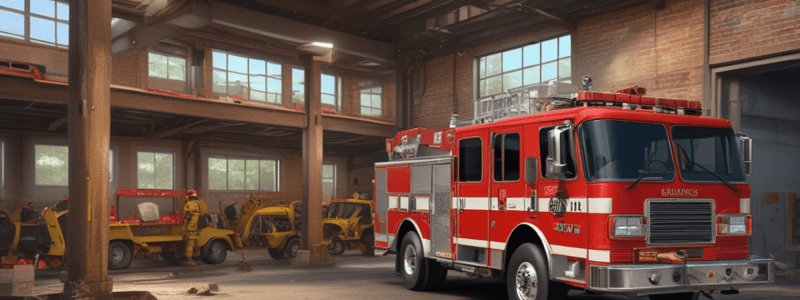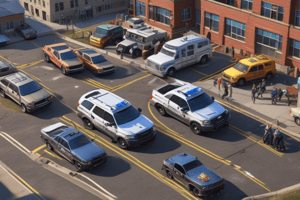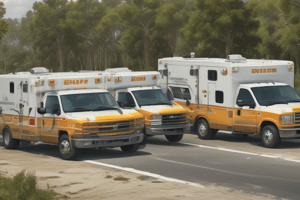Podcast
Questions and Answers
What is the main purpose of first-in units establishing 'Command' at an emergency event?
What is the main purpose of first-in units establishing 'Command' at an emergency event?
- To coordinate the activities of outside agencies
- To begin a systematic method of prioritizing and effectively communicating assignments (correct)
- To release information to the media
- To ensure the Fire Rescue Chief is informed of the incident
Which of the following is NOT one of the three priorities of the Incident Commander (IC)?
Which of the following is NOT one of the three priorities of the Incident Commander (IC)?
- Life Safety
- Property Conservation
- Resource Allocation (correct)
- Incident Stabilization
What is the IC responsible for in terms of the safety, accountability, and welfare of personnel at the incident?
What is the IC responsible for in terms of the safety, accountability, and welfare of personnel at the incident?
- Ensuring firefighter safety has been addressed
- Preventing firefighter injuries and/or death
- Providing for the safety, accountability, and welfare of personnel assigned to the incident
- All of the above (correct)
When should the Incident Command Structure be developed?
When should the Incident Command Structure be developed?
When is there no need to formally announce who is in Command at an incident?
When is there no need to formally announce who is in Command at an incident?
What should be the highest-ranking officer do if two units arrive at the same time?
What should be the highest-ranking officer do if two units arrive at the same time?
When is assumption of Command discretionary for higher seniority personnel arriving on scene?
When is assumption of Command discretionary for higher seniority personnel arriving on scene?
For complex incidents like working structure fires, who should assume Command?
For complex incidents like working structure fires, who should assume Command?
What is the preferred method for transferring Command?
What is the preferred method for transferring Command?
When does Command get transferred to a more senior officer on the scene?
When does Command get transferred to a more senior officer on the scene?
What is required for a higher-ranking officer to assume command?
What is required for a higher-ranking officer to assume command?
What is the responsibility of the initial Incident Commander until Command is transferred?
What is the responsibility of the initial Incident Commander until Command is transferred?
What should be included in the Arrival Report/Initial Communications?
What should be included in the Arrival Report/Initial Communications?
In what situations does a Company Officer take on the Investigation Mode role?
In what situations does a Company Officer take on the Investigation Mode role?
What is required in Offensive Mode?
What is required in Offensive Mode?
When does a Company Officer assume a Defensive Mode role?
When does a Company Officer assume a Defensive Mode role?
What remains consistent throughout the duration of an incident?
What remains consistent throughout the duration of an incident?
What is the primary purpose of the policy?
What is the primary purpose of the policy?
Which personnel are subject to this policy?
Which personnel are subject to this policy?
What is the purpose of standardized definitions in the policy?
What is the purpose of standardized definitions in the policy?
Which incident management system is adopted by St. Johns County Fire Rescue?
Which incident management system is adopted by St. Johns County Fire Rescue?
When is an Incident Commander required according to the policy?
When is an Incident Commander required according to the policy?
What is the policy's approach for more complex incidents?
What is the policy's approach for more complex incidents?
What is the responsibility of Fire Rescue Communications in terms of move-ups?
What is the responsibility of Fire Rescue Communications in terms of move-ups?
What action may be required in cases where weather conditions do not permit safe continuation of emergency activities?
What action may be required in cases where weather conditions do not permit safe continuation of emergency activities?
Why should teams on an emergency scene be called by their correct apparatus name?
Why should teams on an emergency scene be called by their correct apparatus name?
What is a common responsibility for all Company Officers upon arrival at an incident?
What is a common responsibility for all Company Officers upon arrival at an incident?
In what scenario might an Incident Safety Officer (ISO) need to respond early?
In what scenario might an Incident Safety Officer (ISO) need to respond early?
Who has the authority to substitute resources or limit the number of assigned resources at an incident?
Who has the authority to substitute resources or limit the number of assigned resources at an incident?
What does the Incident Commander (IC) typically use to designate formal positions in the Incident Command System (ICS)?
What does the Incident Commander (IC) typically use to designate formal positions in the Incident Command System (ICS)?
In the ICS structure, how should a Division/Group Supervisor refer to themselves when communicating on the radio?
In the ICS structure, how should a Division/Group Supervisor refer to themselves when communicating on the radio?
When no formal ICS assignment is made, what radio call sign should be used by the officer/engineer of a unit like Rescue 7?
When no formal ICS assignment is made, what radio call sign should be used by the officer/engineer of a unit like Rescue 7?
When assigning formal positions in the ICS structure, who may be assigned to fill that new position in addition to their normal role?
When assigning formal positions in the ICS structure, who may be assigned to fill that new position in addition to their normal role?
What is the expected behavior of company officers when multiple units are assigned to the same task?
What is the expected behavior of company officers when multiple units are assigned to the same task?
What is the standard terminology used for referencing the geographic boundaries of an incident like a building?
What is the standard terminology used for referencing the geographic boundaries of an incident like a building?
What should personnel do when assigned to an apparatus at the beginning of their shift or special detail?
What should personnel do when assigned to an apparatus at the beginning of their shift or special detail?
Who is responsible for ensuring that all work is performed safely to protect both self and other workers?
Who is responsible for ensuring that all work is performed safely to protect both self and other workers?
Flashcards are hidden until you start studying
Study Notes
Purpose and Scope
- The purpose of the policy is to provide for the safety of personnel operating at emergency incidents through improved command and control, and to improve the use of resources and tactical effectiveness.
- The policy applies to all personnel of St. Johns County Fire Rescue operating in the field.
Definitions
- The policy uses standardized definitions from the nationally recognized incident management system (NIMS) or incident command system (ICS) to avoid confusion.
ICS System Adopted
- The Incident Command System (ICS) is adopted for use by St. Johns County Fire Rescue, except as modified in the policy.
- The policy describes the basic positions and implementation of the system.
Incident Commander
- An Incident Commander (IC) is required for every applicable incident, regardless of size or complexity.
- The IC has authority to substitute other resources or limit the number of resources assigned to an incident.
- Limiting resources is normally done when a large incident or multiple smaller incidents have made the remaining resources scarce.
Coverage and Move-Ups
- The IC is not responsible for maintaining coverage of all areas of the County or district.
- The responsibility for assigning units to move-up or fill-in for committed units lies with the on-duty Battalion Chief or designated person.
- Fire Rescue Communications monitors the need for staging and move-ups and coordinates with the appropriate officers.
Limitations to Incident Commander’s Authority
- In natural or widespread disasters, an “Area Command” may be established to exercise direction and control of multiple incidents.
- The new Incident Commander does not need to be “on scene” to relieve any existing IC.
Company Officers
- Common command-related responsibilities for all Company Officers include:
- Verifying dispatch information and nametags
- Initiating Command or checking-in
- Obtaining assignment briefing from IC
- Reviewing assignments with subordinates and assigning tasks
- Coordinating activities with adjacent resources
- Keeping supervisor advised of situation and resource status
- Maintaining company integrity and safety
Radio Designations
- The IC’s ability to communicate orders clearly and succinctly eliminates confusion.
- Team-level tactical resources will be called by their correct apparatus name (e.g., Engine 15, Rescue 10, etc.).
- Personnel arriving POV and not part of a team will be assigned to an established team or a leader designated by Command.
Command Responsibilities
- The IC is responsible for the completion of strategic and tactical priorities.
- The three priorities in order are:
- Life Safety
- Incident Stabilization
- Property Conservation
- The IC also has a fourth tactical priority to provide for the safety, accountability, and welfare of personnel assigned to the incident.
Functions of Command
- The IC is responsible for:
- Assuming and announcing Command
- Evaluating the situation
- Initiating and maintaining the communications process
- Identifying the overall strategy and developing an incident action plan
- Assigning companies and personnel
- Developing an incident management organization
- Providing tactical objectives
- Reviewing and revising the incident action plan
- Providing for the continuity, transfer, and termination of Command
Strategic Goals and Tactical Objectives
- The IC is responsible for determining strategic goals and tactical objectives necessary to complete the incident priorities.
Incident Command Structure
- The IC develops an incident command structure appropriate for the incident.
- Positions such as Safety Officer, Division Supervisor, or Planning Section Chief are filled only at the direction of the IC.
Resources
- The IC assesses resource needs and orders resources as needed.
- The IC deploys resources at the incident and releases unneeded resources.
Coordination
- The IC coordinates overall emergency activities and coordinates with outside agencies.
Information Release
- Only the Fire Rescue Chief (or designee) may release information to the media.
Establishing Command
- The first unit or personnel on the scene establishes and announces Command.
- The IC develops an incident command structure appropriate for the incident.
Transfer of Command
- The arrival of a more senior officer on the scene does not automatically transfer Command.
- Command is transferred only when the outlined Transfer-of-Command process has been completed.
- The person assuming Command communicates with the person being relieved by radio or face-to-face.
General Considerations
- The IC has the overall responsibility for managing an incident.
- The IC has complete authority and responsibility for the incident, within the limitations of County and Department policy.
- If a higher-ranking officer wants to effect a change in the management of an incident, they must relay information through the IC.### ICS Structure and Communication
- Individual resources may be assigned to a Section Chief or training officer, using their individual radio designators (e.g. County 2, Training 3)
- IC may elect to keep personnel together, designated by team leader's rank and name (e.g. Engineer Smith, Firefighter Jones)
Division or Group Supervisors
- IC may establish Division or Group Supervisors, or other formal command staff positions, as incident expands
- Individual assigned to this role will normally fill that function for the remainder of the incident
- Designations will relate to strategic assignment or geographic location (e.g. "Ventilation", "Division A", "North Division", "Interior")
Assignments and Supervision
- When assigned to a formal position in ICS structure, individual may be assigned to fill that new position only, or in addition to their normal assignment
- Examples: Lieutenant assumes "Division A" supervisor while remaining in direct supervision of Engine 12, Captain assumes "Interior Division" supervisor and delegates Engine 8 to senior firefighter
Geographic Boundaries
- Geographic boundaries of an incident will be referenced using letters A, B, C, D, etc., starting clockwise from a focal point (most often the address side of the building)
- Buildings with multiple floors will be addressed as floor first, followed by assigned letter (e.g. 2-B, 4-C)
Firefighter Responsibilities
- Ensure nametag is placed on vehicle passport board at the beginning of assigned shift or special detail
- Determine who the Company Officer is for the shift or incident
- Ensure instructions are clear and understood
- Perform all work safely (to protect self and other workers)
- Report accidents, injuries, or unsafe conditions to assigned officer or supervisor
Studying That Suits You
Use AI to generate personalized quizzes and flashcards to suit your learning preferences.




